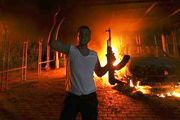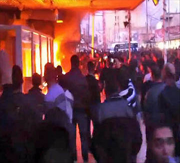 |
| (Images courtesy Open Doors) |
Since the "Arab Spring" began, regimes have fallen and Islamist governments have risen. The turmoil has left many of these Eastern Christians wondering what future is left for them given the corresponding increase in persecution.
President of Open Doors USA David Curry says, "Over the last several decades, we've seen the percentage of the population of Christians drop from about 20% in the Middle East to just 4%." It isn't merely reports of beatings that he finds alarming, but the dramatic shift that they're tracking. "In the next decade or two, unless we do something about it, unless we can find a way to stand up and get heard on this subject, it's possible that Christianity could be extinct in its birthplace."
The reality is that in Pakistan, Egypt, Syria, Palestine, Afghanistan, and Iraq--lands where Christians have lived for 2000 years, being identified as anything but Muslim is dangerous. Curry explains, "Some of it is low-grade discrimination. Some of it is intentional persecution of believers. In other cases, it is outright murder and attacks on believers that are driving them out of their homes. I think the population is being driven out of the Middle East."
Regardless, the current repression clearly communicates that followers of Christ are no longer welcome as full members of society. If nothing changes, that begs the question: Do Christians have a future in the Middle East?
On Sept. 27, a group of academics, politicians, and parliamentarians (all Christians) met in Amman, Jordan to try to scratch out an answer to that question. The conference was titled "Eastern Christians in Light of the Arab Spring."
The group looked at the laws of the land, shifts that subtly altered laws and practices of religious freedom, then the impact on the Christian body, and finally, expectations for the future.
Since the constitutions in many of these countries (except Lebanon) presumes that "Islam is the state religion," Sharia becomes a source of the state's legislation, laws, and regulations. Curry says, "It's basically illegal to decide for yourself what you want to believe. That has very dangerous implications for Christians who may be converting from other religions and deciding that they want to call themselves followers of Jesus.
In many of these places, that marks them immediately for death."
The "religicide" becomes systematic and protected.
Today, more than one million Christians have fled Iraq. Half a million Christians have left Syria, where there were once around 2 million. There remains a remnant church in Egypt. In Lebanon, the retreat is obvious.
Curry notes that despite Islam's obvious impact on the body of Christ, "Christianity is not at the verge of extinction in the Middle East because we've lost the battle of ideas. We are on the verge of being extinct in the Middle East because we are being persecuted, because we are being driven from those areas, and because en masse, we are being targeted for death."
What are the possible ways of dealing with what has become one of the greatest humanitarian catastrophes of our time? Curry takes that question head-on. Be aware. "First of all, I think that there is an element of these extremist groups that is, for lack of a better word, ‘imperialist.' They believe that they can force their faith on people. They'll do it in their regions, and then they're going to do it in our regions."
Be active. Realize that the Gospel is still going forward. Share the predicament of new believers with your Church body.
Also pray. "There's a scriptural premise here, for believers, certainly. It says, ‘When one part of your body hurts, then the whole body hurts.' Right now, we have members of the Christian faith that are suffering; not a few, but millions of people who have no freedom to study and to choose for themselves how they share their faith."



